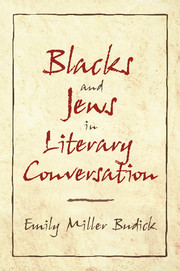Book contents
- Frontmatter
- Contents
- Acknowledgments
- Introduction: “Because you were strangers in the land”
- 1 Mutual Textual Constructions of Black–Jewish Identity
- 2 Crisis and Commentary in African–Jewish American Relations
- 3 Race, Homeland, and the Construction of Jewish American Identity
- 4 Cultural Autonomy, Supersessionism, and the Jew in African American Fiction
- 5 “The Anguish of the Other”: On the Mutual Displacements, Appropriations, and Accommodations of Culture (Toni Morrison, Cynthia Ozick, William Styron, Philip Roth, Grace Paley, and the Jewish–American–Israeli Critic)
- Notes
- Index
Introduction: “Because you were strangers in the land”
Published online by Cambridge University Press: 06 July 2010
- Frontmatter
- Contents
- Acknowledgments
- Introduction: “Because you were strangers in the land”
- 1 Mutual Textual Constructions of Black–Jewish Identity
- 2 Crisis and Commentary in African–Jewish American Relations
- 3 Race, Homeland, and the Construction of Jewish American Identity
- 4 Cultural Autonomy, Supersessionism, and the Jew in African American Fiction
- 5 “The Anguish of the Other”: On the Mutual Displacements, Appropriations, and Accommodations of Culture (Toni Morrison, Cynthia Ozick, William Styron, Philip Roth, Grace Paley, and the Jewish–American–Israeli Critic)
- Notes
- Index
Summary
Even though both blacks and Jews have been strangers of sorts in the land of America and have cast themselves and each other as such in their writings, for the most part their histories have had very little in common. Such interaction as did exist occurred only among slender elements of both populations, and, even then, only at very specific moments and under highly particular circumstances. Notable among these is 1930s and 1940s activism in the Communist Party or labor unions and in the Civil Rights movement of the 1950s and early 1960s. Still, black and Jewish writers, intellectuals, and academics have tended to keep each other in mind, as if, indeed, there were a revelation for each of them in the existence of the other. For a significant number of African and Jewish American writers, the other group becomes a vehicle by which to think through their own ethnic identities. What is not obvious is how blacks and Jews function in each other's thinking and writing. More importantly, perhaps, it is not clear what this relationship means for interethnic dialogue and for the construction of American culture.
This study attempts to record several conversations among prominent African and Jewish Americans. Sometimes the dialogue is explicit, proceeding through essays, letters, and symposia. Sometimes, especially as manifested in fictional writings, it is more indirect. I am not concerned with all black and Jewish writers, or even with all those writers who engage the other ethnic community.
- Type
- Chapter
- Information
- Blacks and Jews in Literary Conversation , pp. 1 - 8Publisher: Cambridge University PressPrint publication year: 1998

